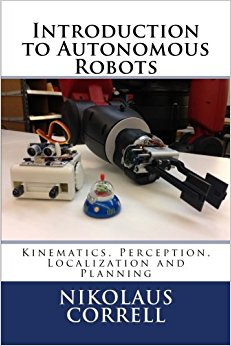
Introduction to Autonomous Robots
This book introduces concepts in mobile, autonomous robotics to 3rd-4th year students in Computer Science or a related discipline.
Tag(s): Artificial Intelligence
Publication date: 06 Oct 2016
ISBN-10: n/a
ISBN-13: 9780692700877
Paperback: 226 pages
Views: 14,382
Type: Textbook
Publisher: n/a
License: Creative Commons Attribution-NonCommercial-NoDerivs 3.0 Unported
Post time: 31 May 2017 08:00:00
Introduction to Autonomous Robots
 This book introduces concepts in mobile, autonomous robotics to 3rd-4th year students in Computer Science or a related discipline.
This book introduces concepts in mobile, autonomous robotics to 3rd-4th year students in Computer Science or a related discipline.
Publication date: 06 Oct 2016
ISBN-10: n/a
ISBN-13: 9780692700877
Paperback: 226 pages
Views: 14,382
Document Type: Textbook
Publisher: n/a
License: Creative Commons Attribution-NonCommercial-NoDerivs 3.0 Unported
Post time: 31 May 2017 08:00:00
Share — copy and redistribute the material in any medium or format
The licensor cannot revoke these freedoms as long as you follow the license terms.
Click here to read the full license.
Nikolaus Correl wrote:This book provides an algorithmic perspective to autonomous robotics to students with a sophomore-level of linear algebra and probability theory. Robotics is an emerging field at the intersection of mechanical and electrical engineering with computer science. With computers becoming more powerful, making robots smart is getting more and more into the focus of attention and robotics research most challenging frontier. While there are a large number of textbooks on the mechanics and dynamics of robots that address sophomore-level undergraduates available, books that provide a broad algorithmic perspective are mostly limited to the graduate level. This book has therefore been developed not to create "yet another textbook, but better than the others", but to allow me to teach robotics to the 3rd and 4th-year undergraduates at the Department of Computer Science at the University of Colorado.
Although falling under the umbrella of "Artificial Intelligence", standard AI techniques are not sufficient to tackle problems that involve uncertainty, such as a robot’s interaction in the real world. This book uses simple trigonometry to develop the kinematic equations of simple manipulators and mobile robots, then introduces path planning, sensing, and hence uncertainty. The robot localization problem is introduced by formally introducing error propagation, which leads to Markov localization, the Particle filter and finally the Extended Kalman Filter, and Simultaneous Localization and Mapping.
Tweet
About The Author(s)
Nikolaus Correll (@correlllab) is an associate professor at the Department of Computer Science with courtesy appointments at the Department of Electrical, Computer and Energy Engineering and the Department of Aerospace Engineering at the University of Colorado at Boulder. His research focuses on a new class of smart materials that deeply embed sensing, actuation, computation and communication in order to adapt their physical properties to changing requirements.

Nikolaus Correll (@correlllab) is an associate professor at the Department of Computer Science with courtesy appointments at the Department of Electrical, Computer and Energy Engineering and the Department of Aerospace Engineering at the University of Colorado at Boulder. His research focuses on a new class of smart materials that deeply embed sensing, actuation, computation and communication in order to adapt their physical properties to changing requirements.